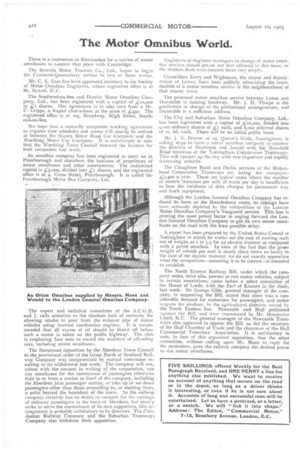The Motor Omnibus World.
Page 6

If you've noticed an error in this article please click here to report it so we can fix it.
There is a movement at Newmarket for a service of motor omnibuses to connect that place with Cambridge.
The Scottish Motor Traction Co., Ltd., hopes to begin the Cramond-Queensferry service in two or three weeks.
Mr. C. E. Esse has been appointed secretary to the Society of Motor Omnibus Engineers, whose registered office is at 86, Strand, W.C.
The Southend-on-Sea and District Motor Omnibus Company, Ltd., has been registered with a capital of Zto,000 in £t shares. One agreement is to take over from a Mr. C. Cripps, a Napier char-a-bane at the price of j;45o. The registered office is at ms, Broadway, High Street, Southend-on-Sea.
We hope that a mutually acceptable working agreement as regards time schedules and routes will shortly be arrived at between the Sussex Motor Road Car Company and the Worthing Motor Car Company. It is satisfactory to note that the Worthing Town Council renewed the licenses for both companies last week.
An omnibus company has been registered to carry on in Peterborough and elsewhere the business of proprietors of motor omnibuses and other conveyances. The authorised capital is ,s,000, divided into ,‘1 shares, and the registered office is at 4, Cross Street, Peterborough. It is called the Peterborough Motor Bus Company, Ltd.
The expert and technical committee of the A.C.G.B. and I. calls attention to the absolute lack of necessity for allowing smoke to pour from the exhaust pipe of motor vehicles using internal combustion engines. It is recommended that all excess of oil should be blown off before such a motor is taken on the public highway. The club is employing four men to record the numbers of offending cars, including motor omnibuses.
The threatened opposition by the Aberdeen Town Council to the provisional order of the Great North of Scotland Railway Company was compromised by mutual concession resulting in its withdrawal last week. The company will not, unless with the consent in writing of the corporation, run any omnibuses for the conveyance of passengers otherwise than to or from a station or hotel of the company, including the Aberdeen joint passenger station, or take up or set down passengers other than those proceeding to, or starting from, a point beyond the boundary of the town. As the railway company certainly has no desire to compete for the carriage of ordinary passengers in the town of Aberdeen, but mere'y seeks to serve the convenience of its own supporters, this arrangement is probably satisfactory to its directors. The Caledonian Railway Company and the Suburban Tramways Company also withdrew their opposition. Engineers or eng;ineer-managers in charge of motor omnibus services should perase our first editorial in this issue, as the matters dealt wah concern them very deeply.
Councillors Every and Wightman, the mayor and deputymayor of Lewes, have been publicly advocating the introduction of a motor omnibus service in the neighbourhood of that county town.
The proposed motor omnibus service between Luton and Dunstable is making headway. Mr. J. H. Thorpe is the gentleman in charge of the preliminary arrangements, and Dunstable is a sufficient address.
The City and Suburban Motor Omnibus Company, Ltd., has been registered with a capital of 4..to,000, divided into 9,000 ordinary shares of ,4",1 each, and 8,000 deferred shares of 2s. 6d. each. There will be no initial public issue.
Mr. J. N. Beevor, of 29, Queen's Walk, Nottingham, is taking steps to form a motor omnibus company to connect the districts of Dayt,rook and Arnold with the Mansfield Road terminus of the Nottingham Corporation Tramways. This will connect up the city with two important and rapidly increasing suburbs.
The Claughton Road and Docks services of the Birkenhead Corporation Tramways are losing the ratepayers ''2,400 a year. These are typical cases where the number of electric tramcars per mile of track per day is insufficient to bear the incidence of debt charges for permanent way and track equipment.
Although the London General Omnibus Company has reduced its fares on the Brondesbury route, its takings have been seriously depleted by the competition of the London Motor Omnibus Company's Vanguard service. This loss is proving the most potent factor in urging forward the London General Omnibus Company to get its own motor omnibuses on the road with the least possible delay.
A report has been prepared by the United States Consul at Nottingham in which he works out the cost of moving each ton of weight as to 3.3 for an electric tramcar as compared with a petrol omnibus. In view of the fact that the gross weight of vehicle per seat is nearly three times as heavy in the case of the electric tramcar, we do not exactly appreciate what the comparison—assuming it to be correct—is intended to establish.
The North Eastern Railway Bill, under which the corns pany seeks, inter cilia, powers to run motor vehicles, subject
to certain restrictions, came before a select committee of the House of Lords, with the Earl of Kintore in the chair, last week. Sir George Gibb, general manager of the company, in supporting the Bill, stated that there was a considerable demand for motorcars for passengers, and motor wagons for produce, in the agricultural districts served by the North Eastern line. Newcastle and Hull petitioned against the Bill, and were represented by Mr. Honoratus Lloyd, K.C. The general manager of the Newcastle Tramways also appeared to oppose the Bill, as did the secretary of the Hull Chamber of Trade and the chairman of the Hull Commercial Travellers' Association. It is satisfactory to note, in face of this organised opposition, that the select committee, without calling upon Mr. Moon to reply for the promoters, gave the railway company the desired power to run motor omnibuses.




















